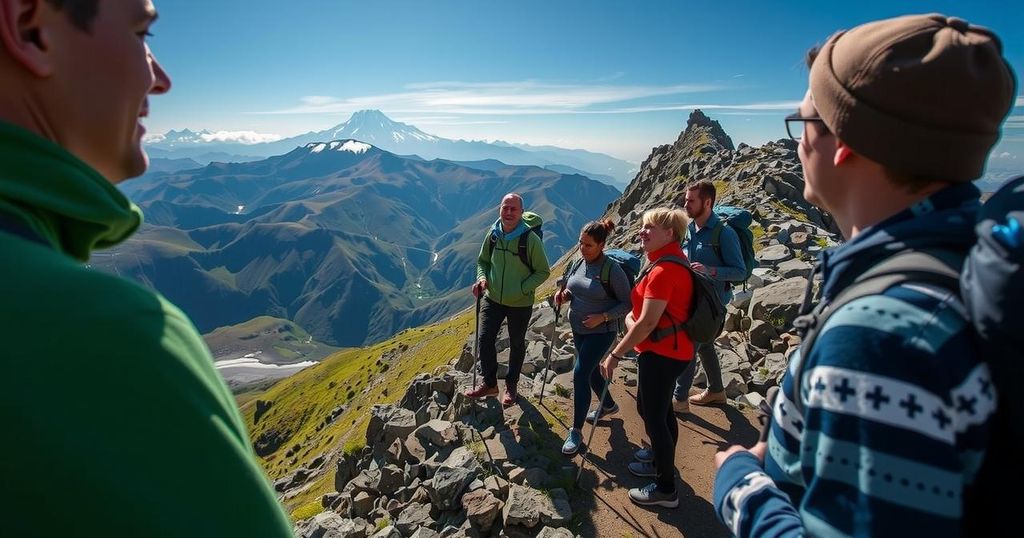UNM Alumni Climb Ecuador’s Peaks to Enhance Prosthetic Accessibility
Four alumni from the University of New Mexico climbed Ecuador’s tallest peaks to raise awareness and funds for prosthetic accessibility. The initiative, led by Kyle Stepp, Sean O’Neill, Jacob Fox, and Allison Gordon, highlighted the challenges faced by individuals with limb loss in Latin America, particularly in Ecuador, where access to quality prosthetics is limited. Their efforts resulted in over $350,000 raised to improve mobility for underrepresented communities.
In a remarkable endeavor to improve the accessibility of prosthetic care, four University of New Mexico alumni recently embarked on a hiking expedition to summit some of the highest peaks in Ecuador. The team included Kyle Stepp, Sean O’Neill, and Jacob Fox, who climbed the 19,000-foot Cayambe volcano, while Allison Gordon ascended Chimborazo, standing over 20,000 feet. Their mission was to raise awareness about the lack of access to assistive devices in Latin America, particularly in Ecuador, where high-quality prosthetic care is often unavailable. The motivation behind this impactful journey lies in the belief that mobility is a fundamental human right. Each climber, driven by their diverse backgrounds and experiences, aimed to advocate for the disabled community and emphasize the need for improved accessibility to prosthetic care. As articulated by Kyle Stepp, “We believe mobility is a human right and should be accessible to everybody.” The World Health Organization estimates that only one in ten people in need have access to assistive products, such as prostheses, due to various barriers, including cost and lack of awareness. In Ecuador, where the need is pronounced, The Range of Motion Project (ROMP) has long been dedicated to rectifying this issue through fundraising and advocacy. The recent hike marked the 10th anniversary of this organization’s efforts to raise funds and awareness, with multiple teams attempting to conquer equally challenging summits. During their stay, the team witnessed ROMP deliver prosthetics to 50 individuals, a profoundly moving experience that highlighted the significance of their work. Stepp recalled the transformative nature of witnessing amputees regain mobility, stating, “Seeing amputees walk for the first time and run for the first time reminds you why access to prosthetics is essential and life-changing.” Despite facing treacherous conditions—like an avalanche risk prompting their retreat at 17,000 feet—Stepp found joy in the experience, choosing to celebrate with a snowball fight instead of dwelling on unachieved summits. The climbers collectively raised over $350,000, contributing significantly to ROMP’s decade-long efforts that have amassed nearly $1 million for the cause. Kyle Stepp’s personal journey adds profound depth to this mission. Diagnosed with Osteosarcoma at 14 and undergoing intensive treatment resulting in limb loss, he has been a vocal advocate for improved access to prosthetic devices. His experiences led to the formation of “So Every BODY Can Move,” advocating for insurance coverage for physical activity-related prosthetics. New Mexico’s pioneering legislation in this area reflects the broader impact of these efforts, which have now influenced eight states in two years. Presently, Stepp continues to strive for excellence as he prepares to represent Team USA at the L.A. 28 Paralympic Games.
The article highlights an inspiring initiative by alumni from the University of New Mexico who climbed significant peaks in Ecuador to advocate for enhanced access to prosthetic care. This undertaking stems from a pressing issue where an estimated 90% of those in need of assistive products, such as prosthetics, lack access due to financial and infrastructural barriers, particularly in developing regions like Ecuador. The Range of Motion Project (ROMP) has spearheaded efforts over the last decade to bridge this gap by raising funds and awareness for individuals living with limb loss in Latin America, emphasizing that mobility is an essential human right.
This endeavor to scale Ecuador’s highest peaks signifies more than a personal challenge for the climbers; it represents a concerted effort to advocate for the rights of individuals with disabilities across Latin America. Through their impact, they have not only raised significant funds but also heightened awareness of the dire need for accessible prosthetic care. The continuous effort by advocates such as Kyle Stepp is promising for future legislative changes aimed at expanding coverage for prosthetics, thereby enhancing the quality of life for many individuals facing limb loss.
Original Source: news.unm.edu




Post Comment